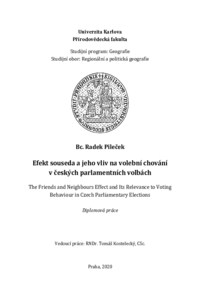Efekt souseda a jeho vliv na volební chování v českých parlamentních volbách
The Friends and Neighbours Effect and Its Relevance to Voting Behaviour in Czech Parliamentary Elections
rigorózní práce (UZNÁNO)

Zobrazit/
Trvalý odkaz
http://hdl.handle.net/20.500.11956/178522Identifikátory
SIS: 254271
Kolekce
- Kvalifikační práce [21522]
Autor
Fakulta / součást
Přírodovědecká fakulta
Obor
Politická a regionální geografie
Katedra / ústav / klinika
Katedra sociální geografie a regionálního rozvoje
Datum obhajoby
13. 12. 2022
Nakladatel
Univerzita Karlova, Přírodovědecká fakultaJazyk
Čeština
Známka
Uznáno
Klíčová slova (česky)
efekt souseda, volební chování, parlamentní volby, Česko, vícenásobná regrese, hot spot analýzaKlíčová slova (anglicky)
friends and neighbours effect, voting behaviour, parliamentary elections, Czechia, multiple regression, hot spot analysisRozhodování voličů o tom, který politický subjekt podpoří ve volbách, je komplexně podmíněný proces. Ke klíčovým faktorům ovlivňujícím naše volební chování se řadí i vliv lokální působnosti konkrétních kandidátů. Mnohé české, ale i zahraniční studie ukazují, že kandidáti získávají výrazně vyšší volební preference v místě svého bydliště a jeho blízkém okolí, což se v rámci analyzovaných voleb do Poslanecké sněmovny ve značné míře projevuje nejen územní koncentrací preferenčních hlasů, nýbrž také na volebním zisku příslušných politických stran či hnutí, které tito kandidáti reprezentují. Tato diplomová práce zkoumá mimo jiné rozdíly v síle popisovaného efektu (odborně nazýván efektem souseda) mezi kandidáty odlišných politických uskupení a v různých regionech Česka. Kvantitativně pojatý výzkum prokázal větší lokální sílu i prostorový rozsah efektu souseda u předních kandidátů z nemetropolitních oblastí, kteří již mají zkušenosti z komunální nebo krajské politiky, například z postů starostů měst a obcí. Ve volbách do Poslanecké sněmovny konaných roku 2017 podmiňoval efekt souseda nejvíce prostorové vzorce volební podpory KDU-ČSL a STAN, na druhou stranu téměř vůbec nebyl pozorovatelný u osobností na kandidátních listinách SPD. Klíčová slova efekt souseda - volební chování - parlamentní volby - Česko -...
Voter decision-making about which political party to support in the elections is a very complex process. One of the key factors influencing our voting behaviour is the effect of particular candidates in terms of their local activities. Many Czech and also foreign studies show that candidates gain significantly higher preferences in the municipality of their residence and its surroundings. Within the analyzed parliamentary elections, this is reflected not only by the territorial concentration of preferential votes, but also by higher local electoral support of the political parties or movements represented by these candidates. This diploma thesis examines, among other things, differences in the strength of the described effect (technically called the friends and neighbours effect) between candidates from different political parties and in different regions of Czechia. Quantitative research has shown greater local strength and spatial extent of friends and neighbours effect for leading candidates from non-metropolitan areas who have experiences from local or regional politics, such as mayors or regional councilors. In the 2017 parliamentary elections, the friends and neighbours effect mostly influenced the spatial patterns of electoral support of the KDU-ČSL and the STAN movement and on the other...
